Festival of Faith & Writing Recap: a Pocketful of Gems
My takeaway of inspiring words for readers and writers.
Hello friend,
I’m back to the normal grind—seeing students online, planning summer projects, feeding the cat, and scooping his litter. But the glow of four days at the Festival of Faith and Writing (FF&W) followed by a two-day anniversary escape with my husband, is still bringing me joy.
We celebrated our 36th anniversary in South Haven, Michigan on a mid-spring Sunday and Monday. We had the beach almost all to ourselves.
“Maybe I can find some beach glass,” I said, looking over the expanse of pure, fine sand on the Lake Michigan shore. I searched (as one does) for those colorful, treasured pieces, and came up (as I usually do) empty-handed.

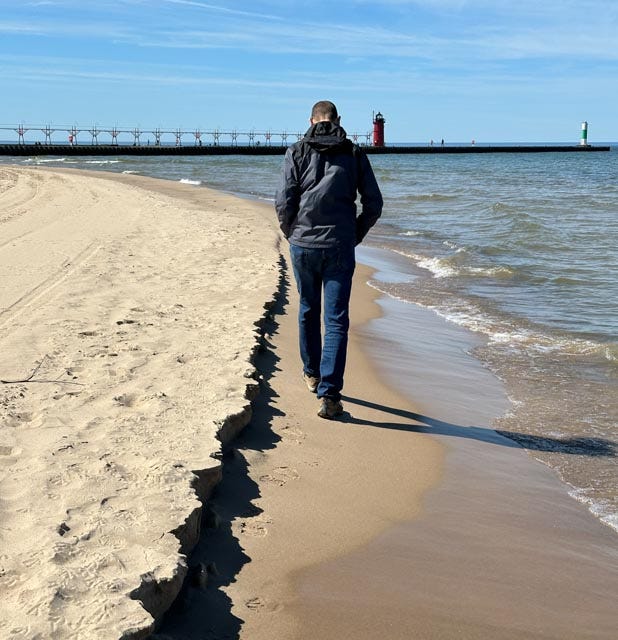
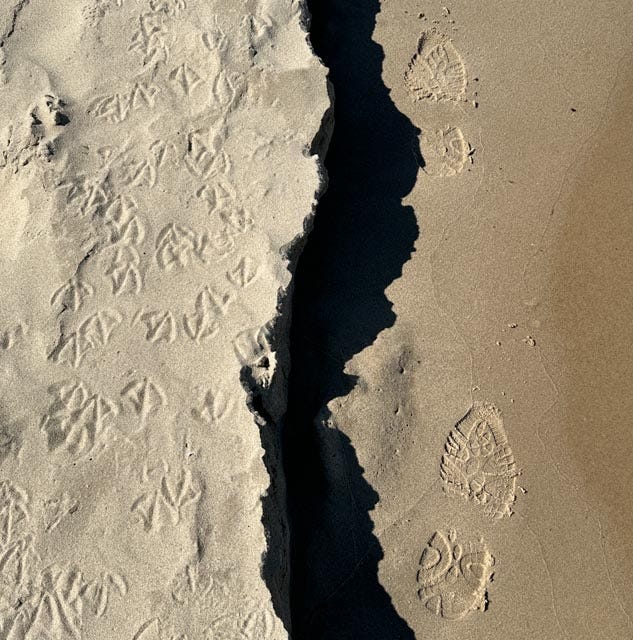
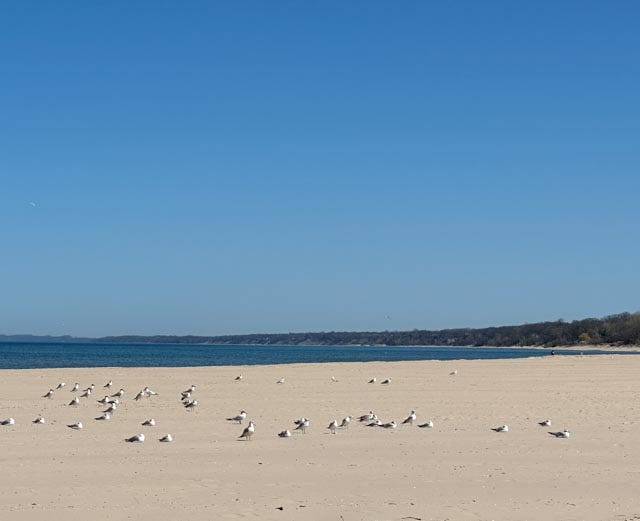
I don’t know if it’s my old eyes, being on the wrong beach at the wrong time, or plain bad luck, but I can never find those blue, green, brown, and white satiny nuggets my kids find by the pocketfuls.
No matter. We had a wonderful, relaxing day. Plus, I already had a journal full of treasures from the previous week at my first-ever “Festival”.
The FF&W has (usually) been held every two years, since 1990. I first became aware of it around 2014, and I dreamt of attending someday. As a newbie writer, I signed up in October 2019, never expecting I’d have to wait another four and a half years for my dream to transpire. Enter a global pandemic, and…you know the rest of the story.
Finally, on April 10, 2024, I stepped on campus—coffee, laptop, journal, and good writing pens in hand. I picked up my nametag and conference program and headed to my first workshop.
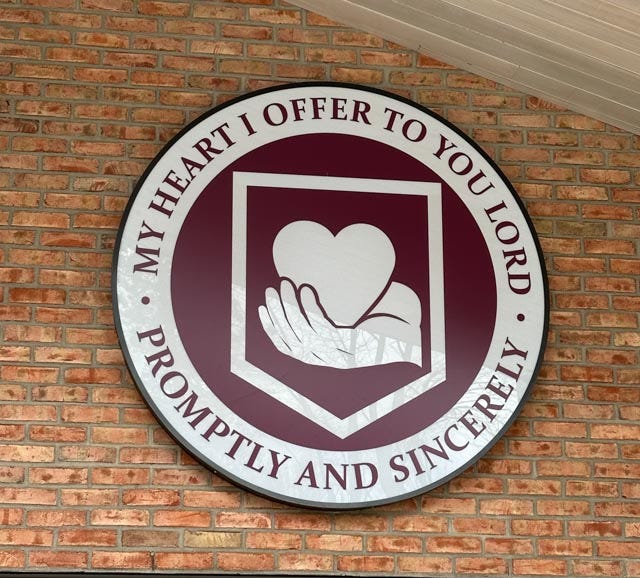
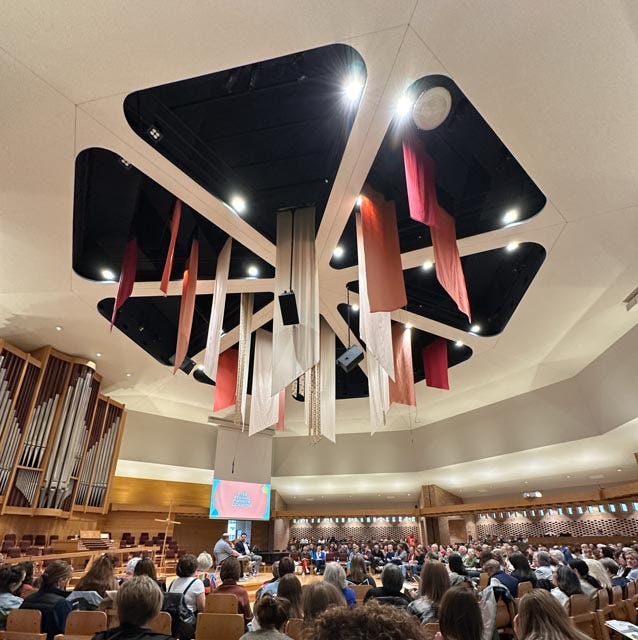
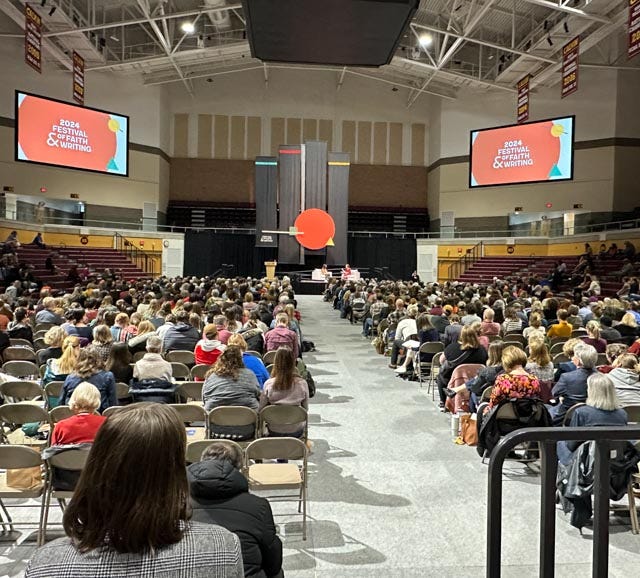
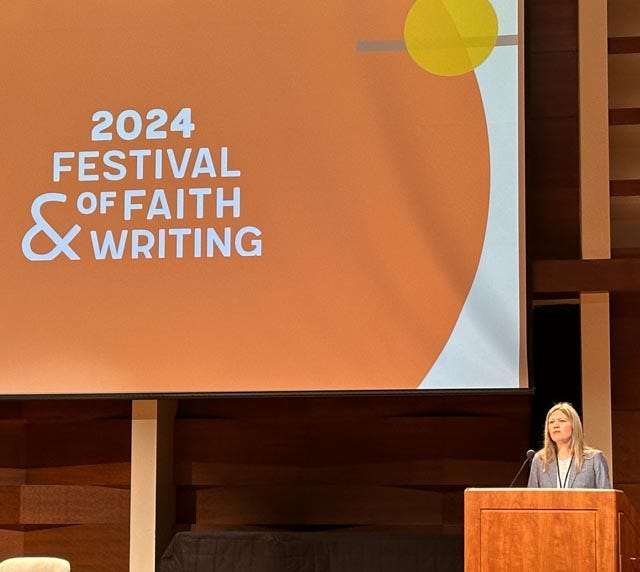
It’s impossible to share all the information, inspiration, and interactions I encountered over those next four days. Instead, I’ll search my notes and find some highlights—nuggets I uncovered throughout the week. Unlike elusive beach glass, with my journal and highlighter, I know I’ll find some treasures to share!
*Note: the following are not exact quotes, but are taken from the notes I quickly scribbled during my sessions. My apologies to any speakers who I may have misquoted.
Nuggets on Reading
“Reading makes us more ourselves…Books offer a shortcut to things we want to talk about or need to understand.” (Anne Bogel on Curating an Online Literary Community.)
“Because of social media, people are only reading what’s on the best-seller list. Independent bookstores are great for pointing people to lesser-known titles and authors.” (Kathy Pories from Panel: The Publishing Industry)
“The best stories aren’t about the ending, but about how we get there.” (Karen Swallow Prior
on Imagination: It’s Not Just Hobbits and Hobby Horses)From the panel: Why Books Matter, here are three brilliant responses to why books are vital in today’s fractious culture and society of “skimmers”.
“Reading books forces us to slow down and be reflective…understanding the inner lives of others and learning more about our external world.” (Karen Swallow Prior
)“Books have a way of sneaking in the back door ideas we thought we were not open to.” (Anne Bogel)
“Books create empathy and humility because you agree to enter someone else’s story. You’re not the center of the world anymore.” (Byron Borger)
Treasures on Writing
From Discovering the Who in Your Whoville, with Margaret Feinberg and Jonathon Merritt:
“If you try to write to everybody, you’ll end up writing to nobody, but if you write to somebody, you’ll create something for anybody.”
“Your audience will change over time, because you will change over time, and the world is constantly changing.”
“The job of a travel writer is to share what you came back with. Not the trinkets and souvenirs, but how the place or experience changed you.” (Daniel Taylor on Spirited Travel Writing.”
“From moments of mortification to magnanimity…our mission is to bring truth, beauty, and goodness to the world.” (Mitali Perkins, plenary session.)
“Two practices to sustain writing year after year, book after book: cultivate a life of adventure and cultivate a life of healing.” (Margaret Feinberg, Taste and See.)
“Rather than trying to write a book that will outlive us, why not try to write a book that creates a better life for us now?” (Ayse Papatya Bucak on How to Be Half, Mixed, Everything, Both, Sort of.)
“When you have the privilege of safety, use it. Risk a 1-star review to stand up for those in war zones…Your writing life is an extension of your prayer life. Pray for clarity about what to speak about.” (Marilyn McEntyre on Writing through the Fog of Fear: Finding Life-Giving Words in an Alarming Time.)
“To be dedicated to writing is to love writing. To be disciplined is a consistent, constant presence. One way of being dedicated is by being disciplined. But we can also be dedicated by writing within our boundaries whenever and wherever we can. Only in going forward can we know how good the boundaries are for us.” (Hilary Yancey on Writing in the Margins.)
Gems on Growing, Learning, Becoming
“Young adults have a BS detector. They smell it if we’re afraid and covering things up. Lean into complexity…don’t give simple, one-track responses, catchphrases, etc. Be honest. Stop pretending.” (Bryan Bliss & James K.A. Smith /
on Writing as Mourning, Writing as Hope: A Conversation about Grief, Lament, and Honesty.)
Regarding fighting racism and using your spiritual gifts… “Don’t get overwhelmed. We don’t need to do all of it. Just a part of it. And we might mess up. Don’t put your faith in the gift but in the Giver.” (Jemar Tisby
on How to Fight Racism: After the Book Study)And finally, here are three gems I gleaned from
’s talk on Reckoning, Discernment, Hope: How Narrative Helps Us Faithfully Inhabit Time:“Nostalgia wants us to stay in the past, but we only remember half. If people want to ‘make the past great again’, whose past? Whose memories? Which half?”
“To get your nostalgic life back, you need to lose your life as it is now.”
“[Hope] is a two-fold process of reckoning and reception. We reckon with the past, and receive gifts from the past that allow us to live into the future.” (James K.A. Smith)
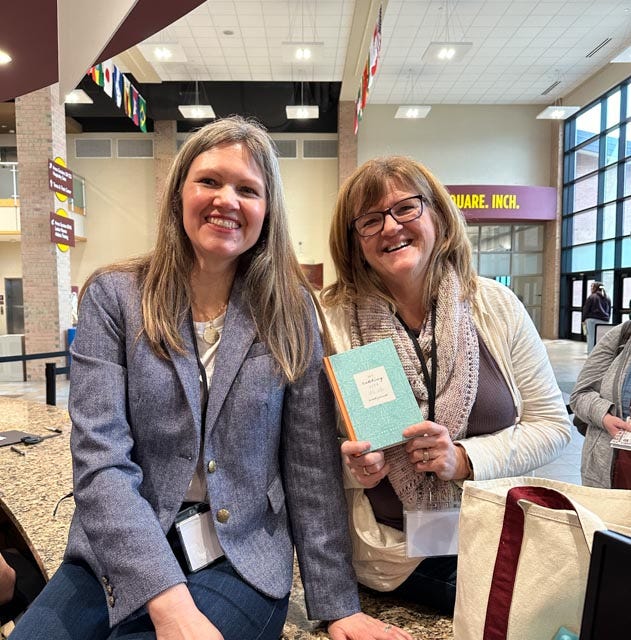
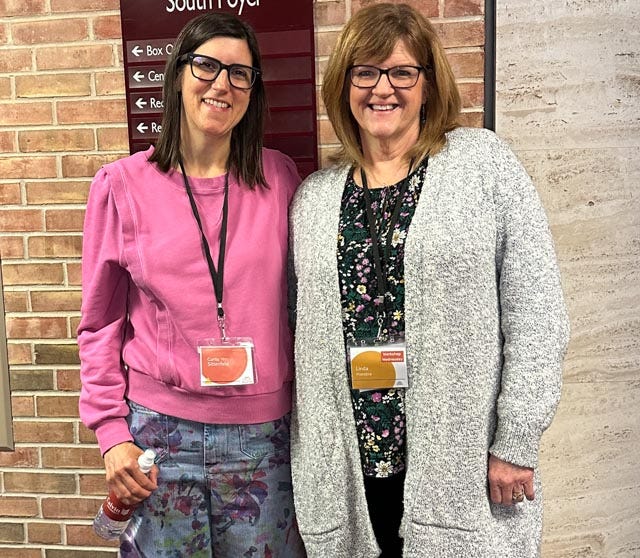
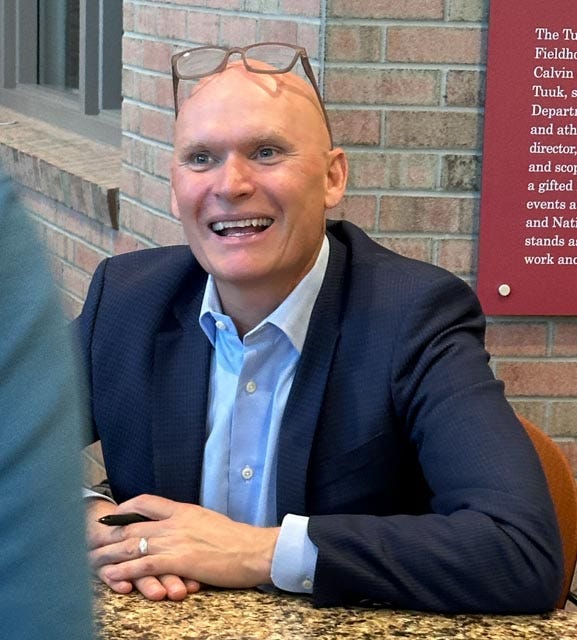
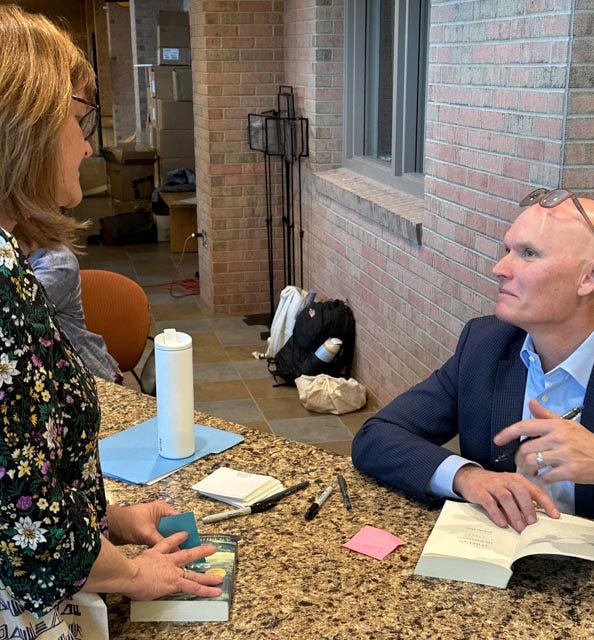
Besides the speakers and sessions quoted above, I loved the interview with Curtis Sittenfeld, NYT bestselling author of several novels, including her recent release, Romantic Comedy. Her spirit of humility, gratitude, and down-to-earth-ness drew me in.
I also enjoyed two days in a “lunch circle” with
and who shed light on using nature and science as art in our writing. They were both delightful, and I picked up a signed copy of Cait’s book, Rift: A Memoir of Breaking Away from Christian Patriarchy (release date: 4/30/24).The final evening’s plenary speaker was my personal highlight. Anthony Doerr (Author of All the Light We Cannot See, Cloud Cuckoo Land, and others) was not only an entertaining and brilliant speaker, but so personable! He took time to chat briefly with each person in the miles-long line for his autograph, including me. It was such “a joy” to meet him!
Have you read any of these authors? Any favorites?
Which of these quotes do you find most meaningful or inspiring?
It’s impossible to convey the depth of the Festival experience, but I hope the gems I’ve shared give you an inkling of the truth, beauty, and goodness that abound when 2,200 writers and readers converge in West Michigan.
If I’ve inspired you to attend in 2026, I’ll see you there!





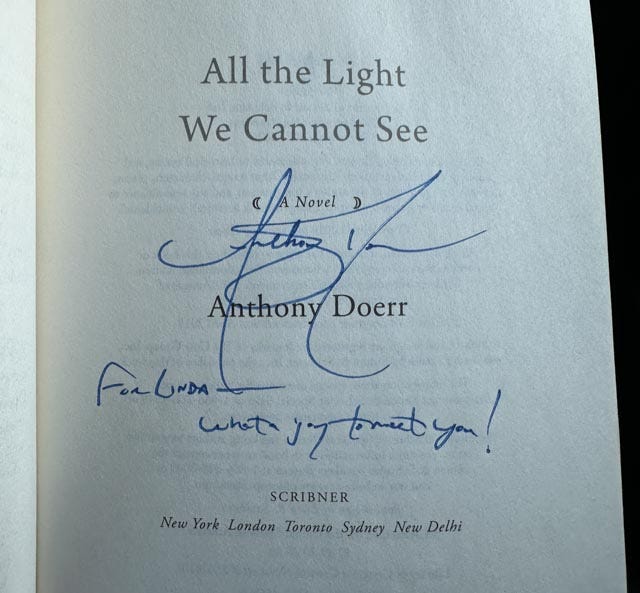
What a beautiful recap, Linda. It sounds like an amazing conference.
I've read All the Light we Cannot See and Cloud Cuckoo Land. How great that Anthony Doerr was there!